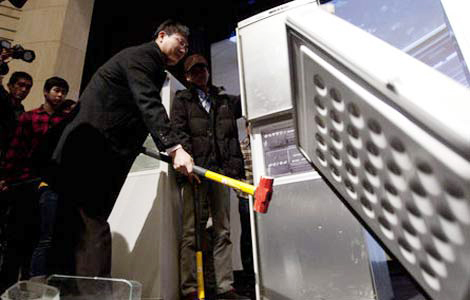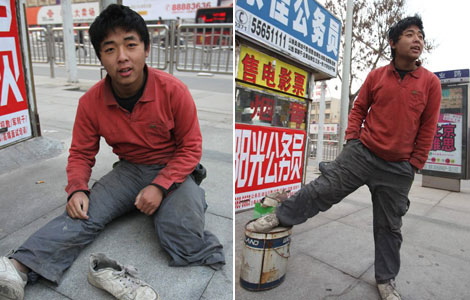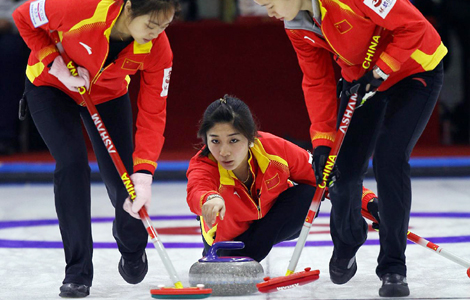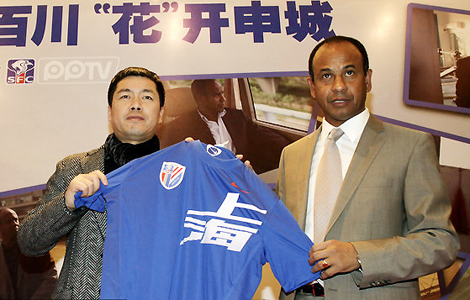VP's visit to Vietnam to boost bilateral ties
Updated: 2011-12-21 16:54
(Xinhua)
|
|||||||||||
HANOI - Chinese Vice President Xi Jinping's visit to Vietnam is conducive to promoting the healthy and stable development of the China-Vietnam comprehensive strategic partnership, says Kong Xuanyou, the Chinese ambassador to Vietnam.
Kong said in a recent interview that China-Vietnam friendly exchanges and cooperation in various fields have seen considerable progress thanks to the joint efforts of both sides.
Fruitful high-level visits and meetings between Chinese and Vietnamese leaders in recent years have boosted mutual trust between the two countries.
Meanwhile, a series of activities have been held to promote relations, including the fifth meeting of the China-Vietnam steering committee, the seventh CPC-CPV Theoretical Seminar and the two navies' joint exercises and annual meeting, Kong said.
The China-Vietnam economic and trade cooperation has also made abundant achievements. China has been Vietnam's largest trading partner for seven consecutive years, and Vietnam is China's fifth largest trading partner in ASEAN.
China-Vietnam bilateral trade volume reached $35.67 billion in the first 11 months of 2011, up 35.2 percent year on year, and is expected to hit a new high this year, Kong said.
The ambassador said China and Vietnam have reached important consensus on maritime issues.
During a visit to China by Nguyen Phu Trong, general secretary of the Communist Party of Vietnam's Central Committee, the two countries issued a joint declaration and signed an agreement guiding the settlement of maritime issues existing between them.
The agreement laid a solid foundation for both countries to properly handle disputes and maintain regional stability through friendly consultations.' Vietnam is China's fourth largest source of overseas students with nearly 16,000 in China. The Chinese Bridge and Chinese teaching volunteer projects are popular among young people in Vietnam.
Besides, the two sides are about to hold the 12th China-Vietnam Youth Friendship Meeting to strengthen cooperation between the youths of both countries, Kong added.
Referring to the significance of Chinese Vice President Xi Jinping's visit to Vietnam, Kong said Xi will be the first member of China's top leadership to visit Vietnam after the election of Vietnamese new leadership early this year. During the visit, both sides will continue to enhance mutual political trust, expand pragmatic cooperation, properly handle differences, deepen cultural exchanges, and exchange in-depth views on major issues related to development of bilateral ties, for a good start of China-Vietnam relationship next year and further promotion of overall strategic cooperation between the two countries under the new situation.
Kong said Vietnam and China are both socialist countries led by the Communist Party, which is the most important common ground between the two countries. Currently, the two countries are in a critical period of reform and development; therefore, to consolidate the friendship and strengthen mutually beneficial cooperation are not only in the interests of the two peoples but also conducive to the development of the socialist cause, as well as the maintenance of peace, stability and prosperity in the region.
According to Kong, the two sides should focus on the following areas to further strengthen cooperation in the coming time: first of all, both sides should further enhance political mutual trust and maintain various forms of high-level contacts, in order to keep the right direction of their bilateral relations. Focus should be made on pragmatic cooperation in the fields of foreign affairs, national defense, public security, external publicity, as well as giving full play to China-Vietnam steering committee on bilateral cooperation.
Secondly, China and Vietnam should further expand mutually beneficial cooperation, including the implementation of the "Five-year Plan for Vietnam-China Economic-Trade Cooperation", support for long-term cooperation on infrastructure and industrial projects, and encouraging more Chinese enterprises to invest in Vietnam.
Thirdly, both sides should properly handle South China Sea issues, implement the agreement on basic principles guiding the settlement of maritime issues, and strictly follow the consensus reached by leaders of both countries, in order to make an effective contribution for maintaining the regional peace and stability.
Furthermore, various exchanges and cooperation should also be expanded in the fields of culture, press and publication, education, science and technology, tourism, health and other cultural areas, to strengthen the friendship between the two peoples and create a favorable social environment for the development of bilateral relations.
Finally, policy coordination on multilateral occasions should be further promoted, including strengthening communication and cooperation in the UN, ASEAN, APEC and the Greater Mekong Subregion-Economic Cooperation, to maintain the common interests of both sides, as well as the interests of developing countries.
As long as China and Vietnam make joint efforts to strengthen dialogue and communication, enhance mutual trust, properly handle differences, and promote mutually beneficial cooperation with a highly responsible attitude towards the bilateral ties and socialist cause, the China-Vietnam relations will certainly continue to move forward in the new situation to benefit the two peoples and make a positive contribution to peace and development in the region and the world, the ambassador said.
Hot Topics
HIV/AIDS, Egypt protest, Thanksgiving, climate change, global economic recovery, home prices, high-speed railways, school bus safety, Libya situation, Weekly photos
Editor's Picks

|

|

|

|

|

|







